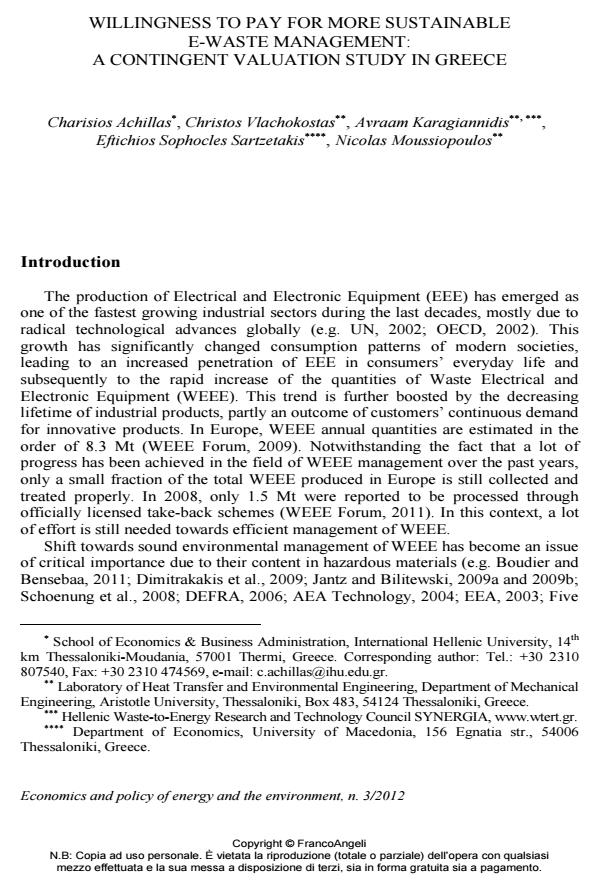Willingness to pay for more sustainable e-waste management: a contingent valuation study in greece
Titolo Rivista ECONOMICS AND POLICY OF ENERGY AND THE ENVIRONMENT
Autori/Curatori Charisios Achillas, Christos Vlachokostas, Avraam Karagiannidis, Eftichios Sophocles Sartzetakis, Nicolas Moussiopoulos
Anno di pubblicazione 2012 Fascicolo 2012/3
Lingua Italiano Numero pagine 17 P. 19-35 Dimensione file 1543 KB
DOI 10.3280/EFE2012-003003
Il DOI è il codice a barre della proprietà intellettuale: per saperne di più
clicca qui
Qui sotto puoi vedere in anteprima la prima pagina di questo articolo.
Se questo articolo ti interessa, lo puoi acquistare (e scaricare in formato pdf) seguendo le facili indicazioni per acquistare il download credit. Acquista Download Credits per scaricare questo Articolo in formato PDF

FrancoAngeli è membro della Publishers International Linking Association, Inc (PILA), associazione indipendente e non profit per facilitare (attraverso i servizi tecnologici implementati da CrossRef.org) l’accesso degli studiosi ai contenuti digitali nelle pubblicazioni professionali e scientifiche.
Management of Waste Electric and Electronic Equipment (WEEE also called e-waste) has become an issue of critical importance recently also in the frame of industrial ecology besides waste management per se, mostly due to their content in hazardous materials and the extensive implications of any intervention in a broad industrial spectrum. The effectiveness of any landfill diversion scheme depends on its acceptance by the local community and the industry, as well as adequate funding. This paper presents a contingent valuation approach in order to examine public environmental awareness and to assess the willingness-to-pay (WTP) for the environmentally sound management of WEEE in Greece, based on a suitable, customized and easy-to-comprehend questionnaire. The survey revealed a still relative public ignorance on the subject and a reluctantly limited WTP. The latter is mostly triggered by the fact that respondents believed that associated expenses should be covered either by authorities or manufacturers (protest votes). However, based on the responses of those declaring a positive WTP, the average fee respondents are willing to pay exceeds the current recycling fee. Thus, existing recycling fees could be potentially increased in order to cover additional expenses for the development of infrastructure in areas not currently included in the national WEEE recycling program, as well as to provide the public with a dense network of disposal sites/bins in an effort to boost participation and WEEE recycling rates.
Parole chiave:WEEE, Willingness to pay, Waste management, Contingent valuation
Jel codes:D61, D78, Q52
- Emerging trends in consumers’ E-waste disposal behaviour and awareness: A worldwide overview with special focus on India Anwesha Borthakur, Madhav Govind, in Resources, Conservation and Recycling /2017 pp.102
DOI: 10.1016/j.resconrec.2016.11.011 - An in-depth literature review of the waste electrical and electronic equipment context: Trends and evolution V Pérez-Belis, MD Bovea, V Ibáñez-Forés, in Waste Management & Research: The Journal for a Sustainable Circular Economy /2015 pp.3
DOI: 10.1177/0734242X14557382
Charisios Achillas, Christos Vlachokostas, Avraam Karagiannidis, Eftichios Sophocles Sartzetakis, Nicolas Moussiopoulos, Willingness to pay for more sustainable e-waste management: a contingent valuation study in greece in "ECONOMICS AND POLICY OF ENERGY AND THE ENVIRONMENT" 3/2012, pp 19-35, DOI: 10.3280/EFE2012-003003